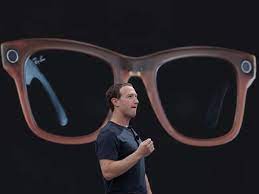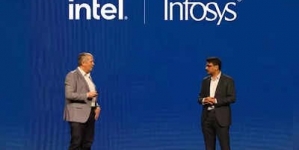-
LONDON: Indian-Origin Teen In UK Gets “Life-Changing” Cancer Treatment - April 25, 2024
-
SILICON VALLEY: All About Pavan Davuluri, New Head Of Microsoft Windows - April 25, 2024
-
LONDON: UK’s India Gate To Commemorate Role Of Indian Soldiers From World Wars - April 24, 2024
-
HARARE: Shri Bramha Kumar appointed as the next Ambassador of India to the Republic of Zimbabwe - April 23, 2024
-
LONDON: Indian-Origin Principal Wins UK Legal Challenge Over School Prayer Ban - April 23, 2024
-
TORONTO: Indian-Origin Doctor Needs ₹ 2 Crore For Legal Fees. Elon Musk Responds - April 22, 2024
-
KINSHASA: India-Democratic Republic of Congo Foreign Office Consultations - April 21, 2024
-
LONDON: UK Court Allows Sale Of Nirav Modi’s Luxury London Apartment - April 21, 2024
-
TEHRAN: Travel advisory for Iran and Israel - April 20, 2024
-
LUXEMBOURG: Shri Saurabh Kumar concurrently accredited as the next Ambassador of India to the Grand Duchy of Luxembourg - April 20, 2024
CALIFORNIA: Meta unveils AI assistant, Facebook-streaming glasses
CALIFORNIA: Meta Platforms (META.O) Chief Executive Mark Zuckerberg on Wednesday rolled out new AI products for consumers, including bots that create photo-realistic images and smart glasses that answer questions, as well as an updated virtual-reality headset.
Zuckerberg described the products as bringing together virtual and real worlds, and underscored that part of what Meta offered was low cost or free AI that could integrate into daily routine. Meta’s Quest is the bestseller in the nascent VR space and the company’s executives described it as the best value in the industry, a nod to the impending release of a much more expensive headset from Apple.
Speaking from a central courtyard on Meta’s sprawling Silicon Valley campus, Zuckerberg said a new generation of Meta’s Ray-Ban (ESLX.PA) smart glasses would start shipping on Oct. 17, priced at $299.
The device will incorporate a new Meta AI assistant and be capable of livestreaming broadcasts of what a user is seeing directly to Facebook and Instagram, an advancement over the previous generation’s ability to snap photos.
Zuckerberg spoke at the Meta Connect conference, the social media company’s biggest event of the year as well as its first in-person conference since the start of the pandemic.
He also said the latest Quest mixed-reality headset would start shipping on Oct. 10 and introduced the company’s first consumer-facing generative AI products. The latter includes a chatbot called Meta AI that can generate both text responses and photo-realistic images.
“Sometimes we innovate by releasing something that’s never been seen before,” Zuckerberg said. “But sometimes we innovate by taking something that is awesome, but super expensive, and making it so it can be affordable for everyone or even free.”
Meta AI will be built in to the smart glasses as an assistant, starting with a beta rollout in the United States. A software update planned for next year will give the assistant the ability to identify places and objects that people are seeing, as well as to perform language translation.
Meta made Meta AI using a custom model based on the powerful Llama 2 large language model that the company released for public commercial use in July. The chatbot will have access to real-time information via a partnership with Microsoft’s (MSFT.O) Bing search engine, Zuckerberg said.
In an interview with Reuters, Meta Global Affairs President Nick Clegg said the company had taken steps to filter private details from the data used to train the model and also imposed restrictions on what the tool could generate, like a ban on the creation of realistic images of public figures.
“We’ve tried to exclude datasets that have a heavy preponderance of personal information,” Clegg said, citing LinkedIn as an example of a website whose content was deliberately not used.
CUSTOM AI BOTS
Meta also announced that it was building a platform that developers and ordinary people alike may use to create custom AI bots of their own, which will have profiles on Instagram and Facebook and eventually appear as avatars in the metaverse.
To demonstrate the tool’s capabilities, Meta created a set of 28 chatbots with different personalities styled in the voices of celebrities like Charli D’Amelio, Snoop Dogg and Tom Brady, according to a company blog post.
The features appeared to be aimed at sprucing up existing apps and devices rather than developing new ad surfaces or other sources of revenue.
“I don’t see monetization of AI products happening for Meta for quite some time and I think it will end up being more indirect. They seem much more interested in helping develop a platform that other developers will use,” said Bob O’Donnell, chief analyst at TECHnalysis Research.
Zuckerberg also said on Wednesday that Xbox cloud gaming is coming to Quest in December.
Meta first announced the Quest 3 headset over the summer, around the time Apple debuted its Vision Pro headset, a high-end product with a price of $3,500.
Starting at $500, the Quest 3 boasts the same mixed-reality technology that premiered in Meta’s more expensive Quest Pro device launched last year, which shows wearers a video feed of the real world around them.
The day’s announcements reflect how Zuckerberg plans to navigate the shift this year of investor fervor to artificial intelligence from augmented and virtual reality technologies.
Stakes for the event were high as investors last year slammed the parent company of Facebook and Instagram for spending extensively on the metaverse, prompting Zuckerberg to lay off tens of thousands of staff to continue funding his vision.
Developers were watching to assess what apps they might create for Meta’s latest hardware devices. Investors, meanwhile, looked for signs of whether a gamble that has lost the company more than $40 billion since 2021 may pay off.























